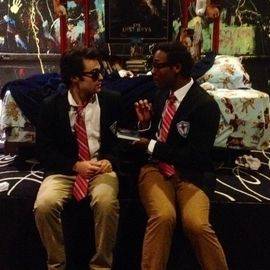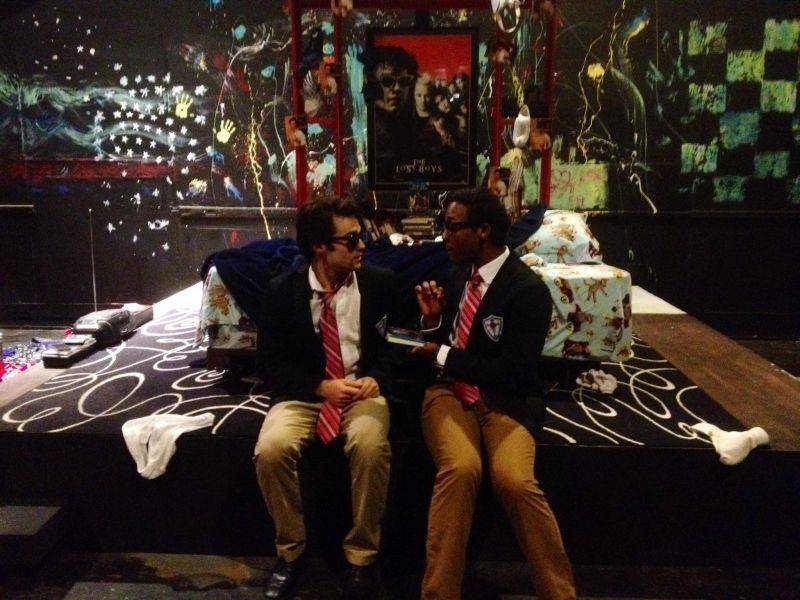
After a brief winter hibernation, it’s time for local theatre groups to get back in action. It’s a new year, and there are new stories to tell. The Station Theatre, true to form, is charging out of the gate with a play you’re not likely to see anywhere else locally.
I spoke with the play’s director (and Smile Politely contributor) Thom Schnarre about the play, the Station, and his cast.
———
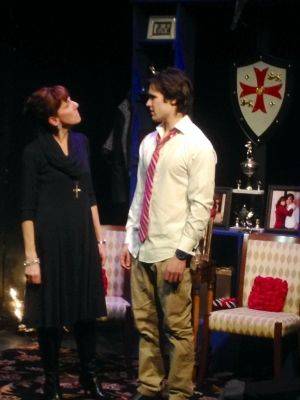 Smile Politely: What drew you to this script?
Smile Politely: What drew you to this script?
Thom Schnarre: I tend to gravitate to scripts with richly developed characters and moral ambiguity. I also really feel theatre should comment on the human condition and should examine the social issues we find uncomfortable or taboo. Good Boys and True is an unflinching script with very sympathetic characters in a very common circumstance that careens out of control. The Hardys are a good family with every advantage who have been taught that their privilege is earned and deserved. They have no idea what their lifestyle has taught their son and his friends, and the repercussions of those lessons resound throughout the piece as truth after truth is unearthed. Every character is at fault, and every character has a redemptive quality that makes the audience want to root for them. The well-drawn characters strapped me in for the ride, and Roberto Aguirre-Sacasa has crafted such an intriguing roller coaster of a script that I couldn’t help but fall in love!
SP: Is there something in particular that makes this a good fit for the Station?
Schnarre: I think the social relevance of the piece is a Station tradition. They choose honest scripts about the issues that directly affect our lives. While Good Boys and True is set in the late 1980s, the themes of school bullying, homophobia, media harassment, and the consequences of a careless moment trusting the wrong person are all issues parents and teens face today. This adult drama honestly examines the actions of our children and where their motivation comes from. It looks at how we view family and how that word can be distorted and tainted by a lack of honesty and open communication.
Also, like most Station entries, it’s just damn good theatre! Each character gives us a chance to showcase the talents of a gifted cast. Rather than being vapid entertainment or emotionally disconnected talking-head-spouting ideology, this piece makes the audience engage and feel because the plight of the characters is so real. It’s very cathartic and gives you something to debate on the ride home. I think The Station has always seen its mission to provide our area with excellent theatre that makes you think, and this piece will do that.
It also was a perfect storm of timing. We had the appropriately aged actors to do this piece. We had a great turn out for auditions, but I would never have submitted it without knowing we could do this play justice through realistic casting. We were very fortunate to have multiple options for each role, and this cast is one of the most gifted I have ever worked with. It’s a joy to watch them inhabit this drama every night.
SP: Speaking of cast… I’m a fan of your lead actor. Tell me about Max and his role in the show… Why him? What does he bring?
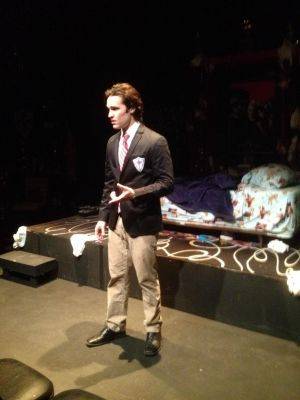 Schnarre: Max Tomaszewski is one of the major reasons I proposed this piece. The role of Brandon Hardy is a tough one to fill because he must remind us all of the perfect son we would like to raise, while possessing the acting chops to go to some really dark and shady places as the play progresses. Max has the look of the “good kid” you want your daughter to date and your little brother to emulate. He’s pleasantly attractive and very charming. Brandon has all of those attributes, but he may be lacking a soul. The tinges of the sociopath may just be the rumbling of a grumpy teen or may be something far more dark and toxic. I needed an actor who could play intensity and also deal with graphic content, and still pass for 17. Max works well on these fronts. Also, I needed an actor who was grounded and knew himself so that the role didn’t swallow him emotionally, and Max is that guy! He’s a joy to work with, and he is willing to really listen to direction and play in the dark. Before auditions, I had spoken extensively with Max about the piece and its demands, as well as to Chris Taber, who plays his mother, Elizabeth. Both of these actors were cast prior to auditions because I knew they could handle the demands of their roles, and so we auditioned the remaining four roles against them. It really made the casting choices clear, and the piece is stronger because of these two anchoring it.
Schnarre: Max Tomaszewski is one of the major reasons I proposed this piece. The role of Brandon Hardy is a tough one to fill because he must remind us all of the perfect son we would like to raise, while possessing the acting chops to go to some really dark and shady places as the play progresses. Max has the look of the “good kid” you want your daughter to date and your little brother to emulate. He’s pleasantly attractive and very charming. Brandon has all of those attributes, but he may be lacking a soul. The tinges of the sociopath may just be the rumbling of a grumpy teen or may be something far more dark and toxic. I needed an actor who could play intensity and also deal with graphic content, and still pass for 17. Max works well on these fronts. Also, I needed an actor who was grounded and knew himself so that the role didn’t swallow him emotionally, and Max is that guy! He’s a joy to work with, and he is willing to really listen to direction and play in the dark. Before auditions, I had spoken extensively with Max about the piece and its demands, as well as to Chris Taber, who plays his mother, Elizabeth. Both of these actors were cast prior to auditions because I knew they could handle the demands of their roles, and so we auditioned the remaining four roles against them. It really made the casting choices clear, and the piece is stronger because of these two anchoring it.
SP: As a director, do you feel that your work falls into any particular genre or category? What is your philosophy of directing?
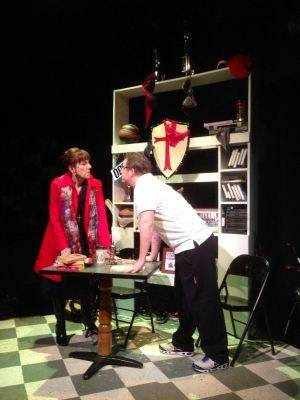 Schnarre: I like things that have a Gothic feel to them. “Gothic” in the sense that you have ordinary people thrown into challenging and threatening circumstances that may change them forever. Watching an innocent lose their guile has always intrigued me, especially when losing it is the only way the character can survive. I also like the stakes of a piece to be emotionally high, and I like a good dose of quirky humor to make the darkness palatable. I tend to roll my eyes at directorial projects where everything is happy and fun and no one has to think. As an audience member, I can enjoy those pieces, but as a director, I want to play in the dark a bit, probably because I’ve survived a lot of darkness in my past. I also tend to gravitate toward personally relevant stories that touch on past scars. With Dead Man’s Cell Phone, I was addressing my own experience with random loss and how it affects us and the world we live in. In How I Learned to Drive, I found a piece that took the risk of showing how ambiguous victimization can be, and how difficult it is to make peace with a past that you can’t clearly define. Superior Donuts focuses on how one mentor can save your life, and I can personally relate to all of these dramatic elements. With Good Boys and True, I relate to how a school and a community can teach horrid lessons and not realize the impact of their actions until its too late. My own high school years were harrowing, and this piece shows how good people can convince their children that doing bad things is okay and those who are hurt in the wake of their actions are inconsequential. The play also has two characters who are victimized by the system who are strong enough to stand up to it and survive its effects. I do like tales of survival.
Schnarre: I like things that have a Gothic feel to them. “Gothic” in the sense that you have ordinary people thrown into challenging and threatening circumstances that may change them forever. Watching an innocent lose their guile has always intrigued me, especially when losing it is the only way the character can survive. I also like the stakes of a piece to be emotionally high, and I like a good dose of quirky humor to make the darkness palatable. I tend to roll my eyes at directorial projects where everything is happy and fun and no one has to think. As an audience member, I can enjoy those pieces, but as a director, I want to play in the dark a bit, probably because I’ve survived a lot of darkness in my past. I also tend to gravitate toward personally relevant stories that touch on past scars. With Dead Man’s Cell Phone, I was addressing my own experience with random loss and how it affects us and the world we live in. In How I Learned to Drive, I found a piece that took the risk of showing how ambiguous victimization can be, and how difficult it is to make peace with a past that you can’t clearly define. Superior Donuts focuses on how one mentor can save your life, and I can personally relate to all of these dramatic elements. With Good Boys and True, I relate to how a school and a community can teach horrid lessons and not realize the impact of their actions until its too late. My own high school years were harrowing, and this piece shows how good people can convince their children that doing bad things is okay and those who are hurt in the wake of their actions are inconsequential. The play also has two characters who are victimized by the system who are strong enough to stand up to it and survive its effects. I do like tales of survival.
SP: And, as usual, you’re wearing a lot of hats on this production.
Schnarre: As a director, I like a collaborative atmosphere, and love having talented support staff and actors to make the piece better. I have a very definite idea of the look of a piece, but the actors shape the message and the focus as much as I do. I also tend to look at other productions to see what elements I like and what elements I want to improve upon. Another aspect of my directorial process is sort of a self-hypnosis through music I find that fits the piece. The music always informs me, and we have selections addressing both loving the wrong man and the darker side of love reflected in our 80s soundtrack. For this piece, I am also the costumer, so I have spent a lot of time watching 1980s films and TV shows. Risky Business, thritysomething, St. Elmo’s Fire, Nine and a Half Weeks, and even a dash of The Exorcist will be seen in the set and costumes. I think that’s important in this work because the boys in the piece would have seen a film like Nine and a Half Weeks and thought, “So that’s how relationships really work.”
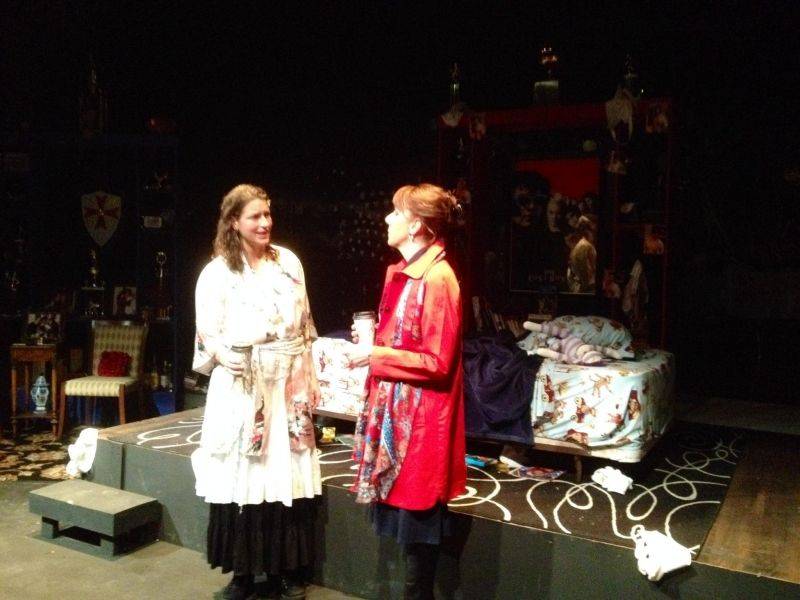
SP: The audience is out there, reading this. Why should they come see this show?
Schnarre: First off, this is an incredibly gifted cast. The first read-through gave me chills. They have just kept building and breathing life into this piece throughout this process, and I expect them to blow the door off the theatre opening night! If you miss these performances, you are missing a truly great theatrical experience. The piece is dark and dramatic, but has a wit about it that an audience will find engaging. Our cast is as charming as they are talented, and I have tried to allow you to see the lightness and fun of the relationships, so you know what is at stake when they are threatened. You will like these characters, and you will root for them as they navigate the turbulence of their lives. It’s also what I’ve been preaching about all Summer and Fall in my Smile Politely musings: It is important for audiences to experience works that can change their world view, and Good Boys and True is that play. Come see this great play, damnit!
———
You’ll have your first chance to see this new play Thursday, January 23. In addition to the aforementioned Maxwell Tomaszewski and Chris Clevidence Taber, the cast includes Station regulars William Anthony-Sebastian Rose II, Martha A. Mills, Aaron Clark, and Stephanie Senior. Tickets for Good Boys and True are currently available by calling the Station Theatre box office (217-384-4000) or by visiting their website. All shows begin at 8 p.m., and, in case it wasn’t clear from the interview, the show contains mature themes and is intended for an adult audience.
Rehearsal photos courtesy of Thom Schnarre.








